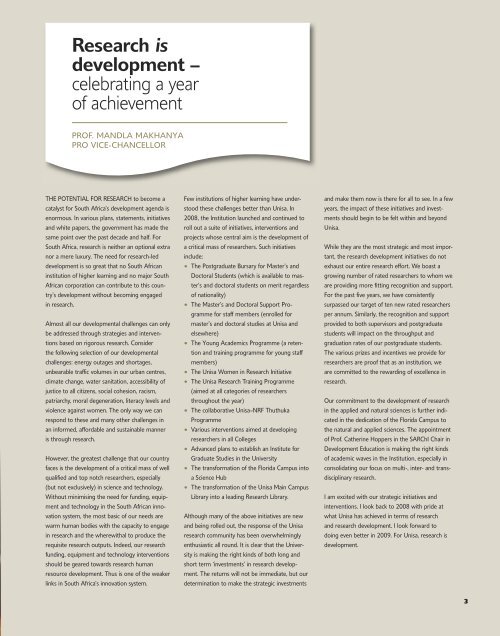Unisa 2008 Research Report - University of South Africa
Unisa 2008 Research Report - University of South Africa
Unisa 2008 Research Report - University of South Africa
You also want an ePaper? Increase the reach of your titles
YUMPU automatically turns print PDFs into web optimized ePapers that Google loves.
<strong>Research</strong> is<br />
development –<br />
celebrating a year<br />
<strong>of</strong> achievement<br />
PROF. MAnDlA MAkHAnyA<br />
PRO VICE-CHAnCEllOR<br />
THE POTEnTIAl FOR RESEARCH to become a<br />
catalyst for <strong>South</strong> <strong>Africa</strong>’s development agenda is<br />
enormous. In various plans, statements, initiatives<br />
and white papers, the government has made the<br />
same point over the past decade and half. For<br />
<strong>South</strong> <strong>Africa</strong>, research is neither an optional extra<br />
nor a mere luxury. The need for research-led<br />
development is so great that no <strong>South</strong> <strong>Africa</strong>n<br />
institution <strong>of</strong> higher learning and no major <strong>South</strong><br />
<strong>Africa</strong>n corporation can contribute to this country’s<br />
development without becoming engaged<br />
in research.<br />
Almost all our developmental challenges can only<br />
be addressed through strategies and interventions<br />
based on rigorous research. Consider<br />
the following selection <strong>of</strong> our developmental<br />
challenges: energy outages and shortages,<br />
unbearable traffic volumes in our urban centres,<br />
climate change, water sanitation, accessibility <strong>of</strong><br />
justice to all citizens, social cohesion, racism,<br />
patriarchy, moral degeneration, literacy levels and<br />
violence against women. The only way we can<br />
respond to these and many other challenges in<br />
an informed, affordable and sustainable manner<br />
is through research.<br />
However, the greatest challenge that our country<br />
faces is the development <strong>of</strong> a critical mass <strong>of</strong> well<br />
qualied and top notch researchers, especially<br />
(but not exclusively) in science and technology.<br />
Without minimising the need for funding, equipment<br />
and technology in the <strong>South</strong> <strong>Africa</strong>n innovation<br />
system, the most basic <strong>of</strong> our needs are<br />
warm human bodies with the capacity to engage<br />
in research and the wherewithal to produce the<br />
requisite research outputs. Indeed, our research<br />
funding, equipment and technology interventions<br />
should be geared towards research human<br />
resource development. Thus is one <strong>of</strong> the weaker<br />
links in <strong>South</strong> <strong>Africa</strong>’s innovation system.<br />
Few institutions <strong>of</strong> higher learning have understood<br />
these challenges better than <strong>Unisa</strong>. In<br />
<strong>2008</strong>, the Institution launched and continued to<br />
roll out a suite <strong>of</strong> initiatives, interventions and<br />
projects whose central aim is the development <strong>of</strong><br />
a critical mass <strong>of</strong> researchers. Such initiatives<br />
include:<br />
• The Postgraduate Bursary for Master’s and<br />
Doctoral Students (which is available to master’s<br />
and doctoral students on merit regardless<br />
<strong>of</strong> nationality)<br />
• The Master’s and Doctoral Support Programme<br />
for staff members (enrolled for<br />
master’s and doctoral studies at <strong>Unisa</strong> and<br />
elsewhere)<br />
• The young Academics Programme (a retention<br />
and training programme for young staff<br />
members)<br />
• The <strong>Unisa</strong> Women in <strong>Research</strong> Initiative<br />
• The <strong>Unisa</strong> <strong>Research</strong> Training Programme<br />
(aimed at all categories <strong>of</strong> researchers<br />
throughout the year)<br />
• The collaborative <strong>Unisa</strong>–nRF Thuthuka<br />
Programme<br />
• Various interventions aimed at developing<br />
researchers in all Colleges<br />
• Advanced plans to establish an Institute for<br />
Graduate Studies in the <strong>University</strong><br />
• The transformation <strong>of</strong> the Florida Campus into<br />
a Science Hub<br />
• The transformation <strong>of</strong> the <strong>Unisa</strong> Main Campus<br />
library into a leading <strong>Research</strong> library.<br />
Although many <strong>of</strong> the above initiatives are new<br />
and being rolled out, the response <strong>of</strong> the <strong>Unisa</strong><br />
research community has been overwhelmingly<br />
enthusiastic all round. It is clear that the <strong>University</strong><br />
is making the right kinds <strong>of</strong> both long and<br />
short term ‘investments’ in research development.<br />
The returns will not be immediate, but our<br />
determination to make the strategic investments<br />
and make them now is there for all to see. In a few<br />
years, the impact <strong>of</strong> these initiatives and investments<br />
should begin to be felt within and beyond<br />
<strong>Unisa</strong>.<br />
While they are the most strategic and most important,<br />
the research development initiatives do not<br />
exhaust our entire research effort. We boast a<br />
growing number <strong>of</strong> rated researchers to whom we<br />
are providing more tting recognition and support.<br />
For the past ve years, we have consistently<br />
surpassed our target <strong>of</strong> ten new rated researchers<br />
per annum. Similarly, the recognition and support<br />
provided to both supervisors and postgraduate<br />
students will impact on the throughput and<br />
graduation rates <strong>of</strong> our postgraduate students.<br />
The various prizes and incentives we provide for<br />
researchers are pro<strong>of</strong> that as an institution, we<br />
are committed to the rewarding <strong>of</strong> excellence in<br />
research.<br />
Our commitment to the development <strong>of</strong> research<br />
in the applied and natural sciences is further indicated<br />
in the dedication <strong>of</strong> the Florida Campus to<br />
the natural and applied sciences. The appointment<br />
<strong>of</strong> Pr<strong>of</strong>. Catherine Hoppers in the SARChI Chair in<br />
Development Education is making the right kinds<br />
<strong>of</strong> academic waves in the Institution, especially in<br />
consolidating our focus on multi-, inter- and transdisciplinary<br />
research.<br />
I am excited with our strategic initiatives and<br />
interventions. I look back to <strong>2008</strong> with pride at<br />
what <strong>Unisa</strong> has achieved in terms <strong>of</strong> research<br />
and research development. I look forward to<br />
doing even better in 2009. For <strong>Unisa</strong>, research is<br />
development.<br />
3

















